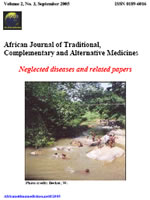
|
African Journal of Traditional, Complementary and Alternative Medicines
African Ethnomedicines Network
ISSN: 0189-6016
Vol. 12, No. 4, 2015, pp. 106-111
|
 Bioline Code: tc15082
Bioline Code: tc15082
Full paper language: English
Document type: Research Article
Document available free of charge
|
|
|
African Journal of Traditional, Complementary and Alternative Medicines, Vol. 12, No. 4, 2015, pp. 106-111
| en |
PROTECTIVE EFFECT OF A MEXICAN PROPOLIS ON MDBK CELLS EXPOSED TO AUJESZKY\'S DISEASE VIRUS (PSEUDORABIES VIRUS)
Búrquez, María de Jesús González; Mosqueda, María de Lourdes Juárez; Mendoza, Humberto Ramírez; Zárate, Carlos I. Soto; Miranda, Liborio Carrillo & Sánchez, Tonatiuh Alejandro Cruz
Abstract
Background: In this paper, the evaluation of the antiviral effect of a Mexican propolis on Pseudo Rabies Virus (PRV) was performed by
infecting cell cultures of MDBK.
Materials and Methods: First, the level of cytotoxicity of the ethanol extract of propolis (EEP) was determined, subsequently, infective dose of
PRV strain Shope was determined and finally, we performed the interaction of the virus with EEP (two hours before, during and two hours after
infection) in MDBK cells. Also, in order to determine the possible effects of propolis on the virus, cell culture samples subjected to the different
treatments mentioned above were processed for Transmission Electron Microscopy (TEM).
Also, cell culture samples with the same treatments were processed for Transmission Electron Microscopy (TEM) to observe possible alterations
of propolis on the virus.
Results: It was determined that administration of 0.5 mg / ml of EEP two hours before infection caused a reduction in the number of plaque
forming units compared to the rest of the treatments used or with the infected and untreated culture, it is important to note that the difference
found was statistically significant (p <0.01). By other hand, viral particles with altered morphology were observed at MET suggesting a possible
damage to the viral envelope proteins. We also found virions in an electro-dense layer formed around the cell membrane. This seems to affect
the penetration of the virus and its replication cycle.
Conclusion: This study demonstrated the antiviral activity of EEP used and its results open perspectives to explore the possibility of using
propolis as a preventive method against pseudo rabies.
Keywords
Mexican propolis; antiviral activity; Aujeszky's disease virus; Pseudo Rabies Virus (PRV)
|
| |
© Copyright 2015 - African Journal of Traditional, Complementary and Alternative Medicines
Alternative site location: http://journals.sfu.ca/africanem/index.php/ajtcam
|
|
